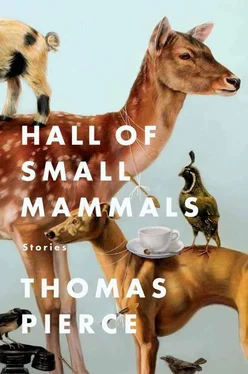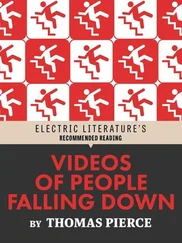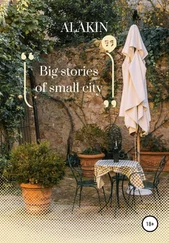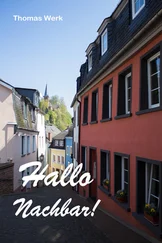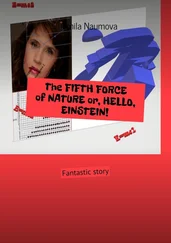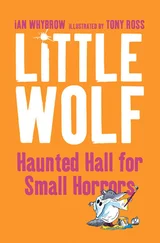Val tapped his sneaker on the asphalt, steaming from the earlier spray of the sprinklers. By this point we’d been waiting for almost an hour and had not even passed the Elephant House. I tugged my shirt off my sticky back to let in some air. Directly behind us in line, a man with a comb-over fished around in his neon green fanny pack and produced two Wetnaps, one for himself and one for his wife, a somber-looking woman in a zebra-print dress that I gathered she had picked out specifically for this excursion. I watched them unfold their antibacterial napkins with care and scrub every inch of their hands — palms, fingers, creases, wrinkles, even up past the wrists. Watching them groom was exhausting. All of this was exhausting.
I was ready to give up and go home, but, ever since seeing the color photo of the Pippins in the magazine insert of the Saturday newspaper, Val had talked about little else. It would make him so happy, his mother had said. Val had studied up on Pippins and knew all there was to know about their tool-making intelligence and diet, about the destruction of their leafy forest home in wherever-it-was, about the mysterious malaise that overcame captive Pippins and made reproduction difficult and rare. Frankly, I didn’t want to hear any more about the godforsaken Pippins.
“So,” I said, trying not to sound bored, “tell me about your novel.” Val looked up at me like I’d just asked him to squash the family hamster.
“First of all,” he said, “it’s not a novel. It’s a screenplay.”
“Oh,” I said. “Sorry, I was under the impression it was a novel.” I didn’t tell him that his mother had more than once referred to it as Val’s not-so-secret secret novel. “What’s it about?”
The boy sighed. “Okay,” he said. “So what do you know about sensory deprivation?”
I admitted that I knew very little about sensory deprivation.
“Well, you probably won’t get it, then,” he said, and writhed loose from his backpack straps. He took out a granola bar and his insulin kit and then handed me the pack like I was his personal valet, which in a way I suppose I was. “I need to go do this now,” he said. “Don’t get out of line. I’ll be right back.”
I watched him waddle off toward the bathrooms taking big bites of the bar. Maybe it was his flat dry hair or his tube socks or his white hairless legs, but Val already had the look of a middle-age government employee. I saw nothing of his mother in him, so he must have resembled his father, a man who lived in the same city but whom I’d never met and never would. I’d been dating Val’s mother for only a few months. She worked in the same building as me but for a separate company. Her department did something that involved cardboard tubes. The tubes were different sizes and lengths and colors. They leaned against all the walls and desks on her floor. She didn’t enjoy discussing her work. “That’s not who I am,” she’d say. By the time we broke up, not long after my visit to the zoo with Val, I still hadn’t figured out if her company shipped the tubes or received them or made them or what.
The couple behind me in line was getting impatient.
“This is ridiculous,” I heard the man say. “They have a responsibility to keep the line moving, don’t they? How much time do you need in there? One look and go.”
The woman examined her zoo map, did some calculations on it with a pen from her purse. “We started here and now we’re here,” she said. “That’s about two hundred feet. Divide by the time, and we’re moving at a rate of”—she scribbled—“three feet per minute.”
“And,” the man said, “so what?”
“That means we should be there in”—she scribbled some more—“seventy-two minutes. At this current rate, I mean.”
“Is that supposed to make me feel better?” the man asked.
I had to agree with the man. Seventy-two minutes was a lifetime. I checked my watch as we shuffled forward. The zoo would close its gates in two hours. The sprinklers came back on outside the Elephant House ahead of us and large misty clouds floated over the ferns along the walkway, giant ferns with long, sweeping fronds that knocked against the shoes of the few people on their way to see the elephants. I searched Val’s backpack for some hard candy. He had some peppermints and half a bag of peach lozenges, and I helped myself to a handful of those. I also couldn’t resist looking at his screenplay. I suppose that’s why, really, I’d opened the bag in the first place. Just to have a quick peek. I didn’t have to take out the pages to read them. Somehow that made it feel like less of a violation.
The title page said Prehistory X by Valentine Creel , and it had his home address at the bottom. The story was about time travel, that much I could see right away. Val’s hero was the son of a famous scientist, who in the first scene turned up dead in her lab. I gathered that by using a sensory deprivation tank the hero’s mother had figured out a way to move through time with her mind. Soon, using his mother’s copious notes, the hero was whipped back to the Bronze Age, a scary place populated by gruesome men with painted faces and women with large “cannonball” breasts. Miraculously everyone spoke English. The villain was some sort of tribal chieftain who was holding the mother captive. Yes, she was still alive. I no longer remember how Val explained it scientifically but I think it involved a disembodied mind, forever lost in time.
“Give me some skin,” the villain said at one point, spear raised. The line stuck out because it was something I often said to Val, ironically, palm raised for a high five, though of course in the context of this scene, the line must have had a different, more ominous meaning. Prehistory X was not very subtle in its intentions. I had no trouble working out what was going on. The villain was me, clearly, and I was probably going to die before the end of the movie. I should have hated the script, I suppose, but partly I was honored to be included at all.
“I think the pace is picking up,” the woman behind me said, and when I looked up, I saw that she was right. We were really moving now. I could see the entrance to the Hall of Small Mammals, its brown double doors open wide to receive us. But where was Val? I scanned the crowds. Had I been wrong to let a twelve-year-old go off on his own at a public zoo? I was beginning to suspect that I’d made a poor decision. My experience with children was and is fairly limited. I have two nieces that I rarely see in person, though my fridge is plastered with their childhood photos and printed emails. My older brother, the girls’ father, once said that being a parent is the most important thing he’s ever done with his life. I’ve never had the nerve to ask him what that says about my life.
“Here we go,” the woman said. “I can’t wait. I’ll bet they are so adorable. I wish we could touch one.”
I stepped out of line and gazed back at the man and woman and all the people behind them. I didn’t see any sign of Val. He’d been gone for more than twenty minutes.
“Would you mind holding my place?” I asked the couple.
The woman said of course they wouldn’t mind, but my request agitated the man. He rotated his fanny pack from right to left hip. “Well,” he added, “we can try.”
I set off for the bathrooms with Val’s blue backpack over my shoulder. Children streamed by eating cotton candy and peanuts and hugging plush animal toys — pandas and giraffes and hippos. Before the Elephant House, I turned left up the paved path to the Hall of Great Apes, just in case Val had gotten distracted. Overhead, along cables that connected the Ape Hall to what looked like a cell phone tower, an orangutan bounced up and down on the lines. Long sinewy muscles, pouting mouth, thin orange hair — the orangutan had the look of an aging body builder, a creature long past his prime but presiding over the crowds from his cables. He tracked my progress toward the door.
Читать дальше
